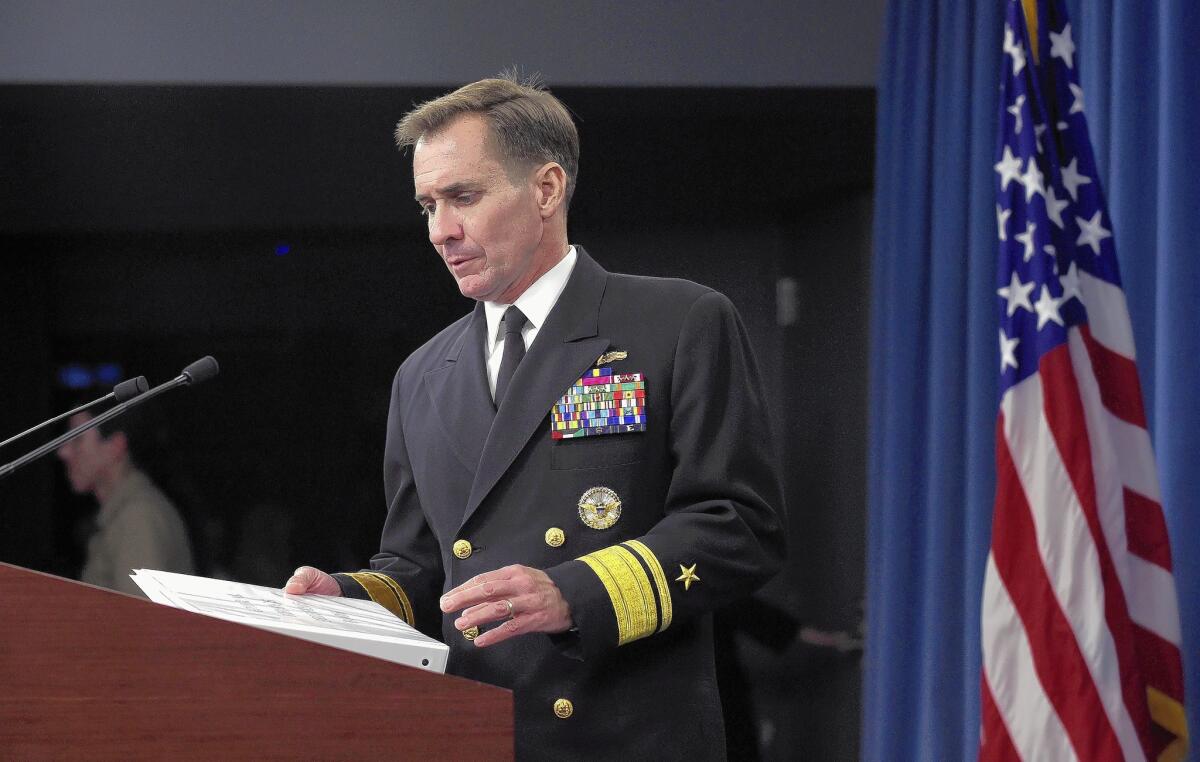U.S. cracks down on Somalia militants with strike on Shabab leader

- Share via
Reporting from Washington — A U.S. airstrike intended to kill the leader of Somalia’s Al Qaeda-affiliated Shabab group illustrated the Pentagon’s determination to take down militants responsible for a wave of bombings and suicide attacks throughout the Horn of Africa.
The Pentagon on Tuesday did not confirm whether the operation — which took place late Monday — killed Shabab leader Ahmed Abdi Godane, 37. But the special-forces strike against a militant encampment in the town of Barawe, south of the Somali capital, Mogadishu, was seen by U.S. officials as a setback for the Islamic militant group, which has struggled in recent years with leadership disputes, military defeats and questions about its direction.
“We are assessing the results right now,” said Pentagon spokesman Rear Adm. John Kirby. “We certainly believe that we hit what we were aiming at.”
Godane, who took over the Shabab in 2008, is on the U.S. list of most-wanted militants, with a $7-million bounty on his head. The Pentagon’s action reflects the seriousness with which U.S. officials view the threat posed by the group.
“If we killed him, it is a significant blow to their organization and to their abilities,” Kirby said.
Both manned and unmanned aircraft were used in the attack, which included several Hellfire missiles and laser-guided munitions, officials said.
In recent months, the Shabab has claimed responsibility for several attacks along Kenya’s coast that have killed dozens of people. It was responsible for last year’s attack on an upscale mall in Nairobi that left about 70 people dead and 200 injured. The group also has carried out suicide attacks in Mogadishu and in central and northern Somalia, typically targeting allies of Somalia’s federal government.
Under Godane’s guidance, the group has carried out killings, amputations and other violence, alienating some Somalis. When famine struck the country in 2011, the Shabab blocked humanitarian aid, intensifying doubt within the group about Godane’s leadership style.
“Godane has been the driving force behind most of the atrocities that took place,” said Cedric Barnes, a Horn of Africa analyst at International Crisis Group, a Brussels-based think tank. “Removing him from the picture will significantly weaken Shabab, at least in the short term.”
The Shabab, which controls a large swath of rural Somalia, has been trying to regain power since being driven out of Mogadishu and the port city of Kismayo by African Union troops in 2011 and 2012.
“Shabab has been losing militarily, but has successfully been attacking targets inside Mogadishu,” said Stig Hansen, author of “Al Shabab in Somalia: The History and Ideology of a Militant Islamist Group, 2005-2012.”
Godane, highly ambitious but seen as remote from his followers, is a veteran of militant training in Afghanistan who reportedly enjoys penning poetry. He’s rarely photographed, but releases occasional audio statements in a droning, pious tone.
He pledged allegiance to Al Qaeda in 2009, but was initially snubbed by Osama bin Laden. After the Al Qaeda leader’s death in May 2011, the two terrorist groups affiliated early last year. The alliance triggered internal struggles over the Shabab’s direction and leadership.
An anti-Godane faction emerged, insisting that the Shabab concentrate on regaining power in Somalia rather than waging a global militancy. Shabab co-founder Ibrahim Haji Jama Mead, better known as Afghani, grew concerned about Godane’s agenda and tyrannical approach, which included sometimes jailing and harassing foreign fighters who came to assist the Shabab.
Last year Afghani posted an open letter on the Internet to Al Qaeda leader Ayman Zawahiri on behalf of the “silent majority” of Shabab fighters, appealing to him to do something about Godane. Afghani said the Shabab had lost territory and support because of an “internal deviation” and accused Godane of oppressing Muslims, crushing talented recruits, locking up militants in secret jails and undermining the militant spirit.
More to Read
Sign up for Essential California
The most important California stories and recommendations in your inbox every morning.
You may occasionally receive promotional content from the Los Angeles Times.










